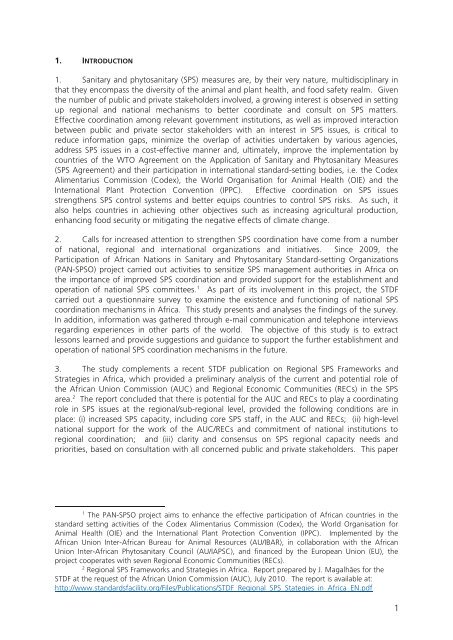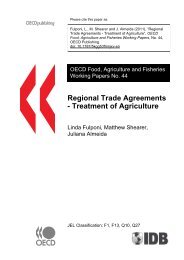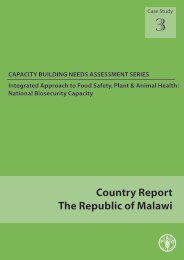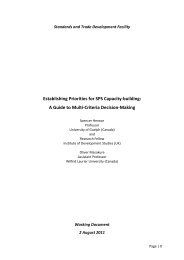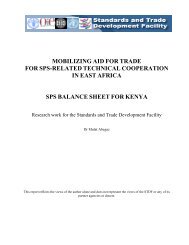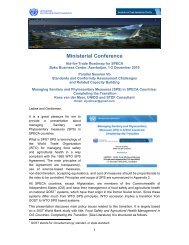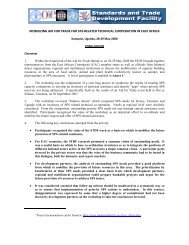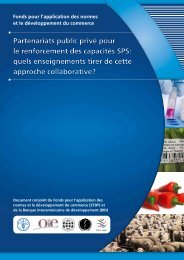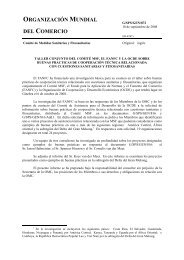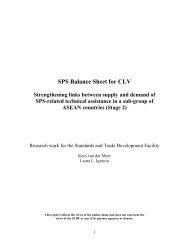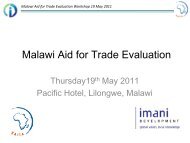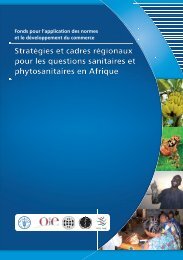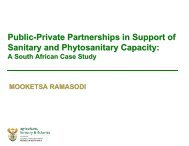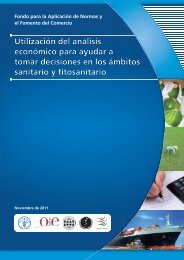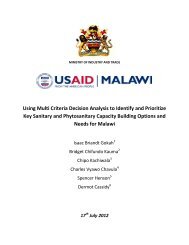National SpS Coordination Mechanisms - Standards and Trade ...
National SpS Coordination Mechanisms - Standards and Trade ...
National SpS Coordination Mechanisms - Standards and Trade ...
Create successful ePaper yourself
Turn your PDF publications into a flip-book with our unique Google optimized e-Paper software.
1. INTRODUCTION1. Sanitary <strong>and</strong> phytosanitary (SPS) measures are, by their very nature, multidisciplinary inthat they encompass the diversity of the animal <strong>and</strong> plant health, <strong>and</strong> food safety realm. Giventhe number of public <strong>and</strong> private stakeholders involved, a growing interest is observed in settingup regional <strong>and</strong> national mechanisms to better coordinate <strong>and</strong> consult on SPS matters.Effective coordination among relevant government institutions, as well as improved interactionbetween public <strong>and</strong> private sector stakeholders with an interest in SPS issues, is critical toreduce information gaps, minimize the overlap of activities undertaken by various agencies,address SPS issues in a cost-effective manner <strong>and</strong>, ultimately, improve the implementation bycountries of the WTO Agreement on the Application of Sanitary <strong>and</strong> Phytosanitary Measures(SPS Agreement) <strong>and</strong> their participation in international st<strong>and</strong>ard-setting bodies, i.e. the CodexAlimentarius Commission (Codex), the World Organisation for Animal Health (OIE) <strong>and</strong> theInternational Plant Protection Convention (IPPC). Effective coordination on SPS issuesstrengthens SPS control systems <strong>and</strong> better equips countries to control SPS risks. As such, italso helps countries in achieving other objectives such as increasing agricultural production,enhancing food security or mitigating the negative effects of climate change.2. Calls for increased attention to strengthen SPS coordination have come from a numberof national, regional <strong>and</strong> international organizations <strong>and</strong> initiatives. Since 2009, theParticipation of African Nations in Sanitary <strong>and</strong> Phytosanitary St<strong>and</strong>ard-setting Organizations(PAN-SPSO) project carried out activities to sensitize SPS management authorities in Africa onthe importance of improved SPS coordination <strong>and</strong> provided support for the establishment <strong>and</strong>operation of national SPS committees. 1 As part of its involvement in this project, the STDFcarried out a questionnaire survey to examine the existence <strong>and</strong> functioning of national SPScoordination mechanisms in Africa. This study presents <strong>and</strong> analyses the findings of the survey.In addition, information was gathered through e-mail communication <strong>and</strong> telephone interviewsregarding experiences in other parts of the world. The objective of this study is to extractlessons learned <strong>and</strong> provide suggestions <strong>and</strong> guidance to support the further establishment <strong>and</strong>operation of national SPS coordination mechanisms in the future.3. The study complements a recent STDF publication on Regional SPS Frameworks <strong>and</strong>Strategies in Africa, which provided a preliminary analysis of the current <strong>and</strong> potential role ofthe African Union Commission (AUC) <strong>and</strong> Regional Economic Communities (RECs) in the SPSarea. 2 The report concluded that there is potential for the AUC <strong>and</strong> RECs to play a coordinatingrole in SPS issues at the regional/sub-regional level, provided the following conditions are inplace: (i) increased SPS capacity, including core SPS staff, in the AUC <strong>and</strong> RECs; (ii) high-levelnational support for the work of the AUC/RECs <strong>and</strong> commitment of national institutions toregional coordination; <strong>and</strong> (iii) clarity <strong>and</strong> consensus on SPS regional capacity needs <strong>and</strong>priorities, based on consultation with all concerned public <strong>and</strong> private stakeholders. This paper1The PAN-SPSO project aims to enhance the effective participation of African countries in thest<strong>and</strong>ard setting activities of the Codex Alimentarius Commission (Codex), the World Organisation forAnimal Health (OIE) <strong>and</strong> the International Plant Protection Convention (IPPC). Implemented by theAfrican Union Inter-African Bureau for Animal Resources (AU/IBAR), in collaboration with the AfricanUnion Inter-African Phytosanitary Council (AU/IAPSC), <strong>and</strong> financed by the European Union (EU), theproject cooperates with seven Regional Economic Communities (RECs).2Regional SPS Frameworks <strong>and</strong> Strategies in Africa. Report prepared by J. Magalhães for theSTDF at the request of the African Union Commission (AUC), July 2010. The report is available at:http://www.st<strong>and</strong>ardsfacility.org/Files/Publications/STDF_Regional_SPS_Stategies_in_Africa_EN.pdf1


